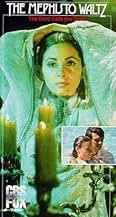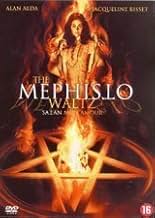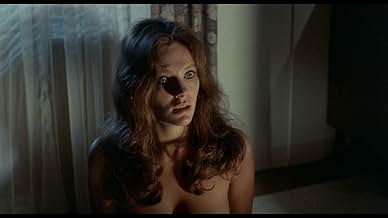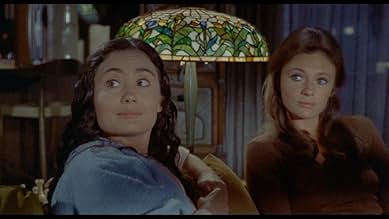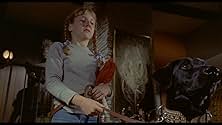IMDb RATING
6.1/10
3.5K
YOUR RATING
An old, dying satanist arranges to transfer his soul into the body of a young concert pianist.An old, dying satanist arranges to transfer his soul into the body of a young concert pianist.An old, dying satanist arranges to transfer his soul into the body of a young concert pianist.
- Director
- Writers
- Stars
- Awards
- 1 nomination total
Bradford Dillman
- Bill Delancey
- (as Brad Dillman)
Curd Jürgens
- Duncan Ely
- (as Curt Jurgens)
Berry Kroeger
- Raymont
- (as Barry Kroeger)
Terrence Scammell
- Richard
- (as Terence Scammell)
Leon Alton
- Pallbearer
- (uncredited)
Antoinette Bower
- Member of Ely's Group
- (uncredited)
- Director
- Writers
- All cast & crew
- Production, box office & more at IMDbPro
Featured reviews
Too bad this neglected horror film got lost in the wake of the similarly themed Rosemany's Baby. Modestly successful journalist Alan Alda suddenly becomes a successful concert pianist following a chance meeting with piano virtuoso Duncan Ely (Curt Jergens) and his darkly seductive daughter, Roxanne (Barbara Parkins). His growing involvement with the wealthy family and their strange friends eventually comes between Alda and his loving wife, Paula (Jackie Bissett). As sinister events unravel, Paula is drawn deeper into a web of diabolic happenings until the threads come together in a surprising and oddly gratifying climax.
The script is tight and well-thought out, with the exception of Dillman's role as Roxanne's ex-husband. After all, if the diabolists are so sexually compelling, how could he divorce her. And though director Paul Wendkos occasionally goes overboard with the camera tricks, the scenes are stylishly done, especially the banquet with its snatches of pretentious banter, and the New Years party with its erotic grotesqueries bound to end in an orgy. And underneath it all lies an undercurrent of evil, even during the brightest splashes of sunlight.
Though Alda gets star billing, it's actually Bissett's movie, which she carries off in finely shaded fashion. Her scenes with the ominously silent Roxanne (just count Parkins' few lines) amount to an exquisite model of civilized contempt, minus the fisticuffs. Alda too, shines, as he acts out Ely's imperious manner at just the right moments, proving in those pre-MASH days that he was more than the humorously caustic Hawkeye Pierce.
As good as the movie is, I can't help wondering if it might have been even better had the mystery not been exposed as early as it is. Suppose the script had skipped the transference ritual and simply had Alda take on Ely's characteristics without explanation, such that the audience would have to ponder what's going on, instead of having it handed to them. There may have been good reasons for not taking this mystery route, but at least it's worth considering.
Still and all, Waltz remains a fine example of movie horror done in both color and sunny surroundings, and with a lot of style and conviction. Too bad, it's slipped into movieland's version of yester-year oblivion. It deserves better. And, if nothing else, the script raises the scary question of whether dogs really are man's (woman's) best friend.
The script is tight and well-thought out, with the exception of Dillman's role as Roxanne's ex-husband. After all, if the diabolists are so sexually compelling, how could he divorce her. And though director Paul Wendkos occasionally goes overboard with the camera tricks, the scenes are stylishly done, especially the banquet with its snatches of pretentious banter, and the New Years party with its erotic grotesqueries bound to end in an orgy. And underneath it all lies an undercurrent of evil, even during the brightest splashes of sunlight.
Though Alda gets star billing, it's actually Bissett's movie, which she carries off in finely shaded fashion. Her scenes with the ominously silent Roxanne (just count Parkins' few lines) amount to an exquisite model of civilized contempt, minus the fisticuffs. Alda too, shines, as he acts out Ely's imperious manner at just the right moments, proving in those pre-MASH days that he was more than the humorously caustic Hawkeye Pierce.
As good as the movie is, I can't help wondering if it might have been even better had the mystery not been exposed as early as it is. Suppose the script had skipped the transference ritual and simply had Alda take on Ely's characteristics without explanation, such that the audience would have to ponder what's going on, instead of having it handed to them. There may have been good reasons for not taking this mystery route, but at least it's worth considering.
Still and all, Waltz remains a fine example of movie horror done in both color and sunny surroundings, and with a lot of style and conviction. Too bad, it's slipped into movieland's version of yester-year oblivion. It deserves better. And, if nothing else, the script raises the scary question of whether dogs really are man's (woman's) best friend.
At least two people below comment on the frequent appearance of the boom mike in this film. To clarify, that is the fault of the TV company / Video company for screening the film in the wrong aspect ratio. It is not the fault of the filmmakers. If you saw this film in the cinema there would be no boom mike since the top of the frame would be masked off by the lens gate. The TV company is showing you the full frame of the picture which should not be all visible to the audience.
The first indication that this is going to be a science fiction/fantasy film is the fact that Alda is married to Bisset! Doubtful..... They play a relatively happy couple who become embroiled into the lives of an eccentric concert pianist (Jurgens) and his rather creepy daughter (Parkins.) As Alda continues to find himself in the world of the very rich and very indulgent Jurgens, Bisset realizes that something is very wrong. It seems that Jurgens wants to (with a little help from Satan) put his soul into Alda's body. (It is emphasized that it's due to his incredible piano hands, not for any other esoteric things that Alda has to offer......though, truthfully, this is probably about the best Alda ever looked.) Though Alda gets top billing, this is really Bisset's story as she tries to navigate the world of the devil cult before they can set their sights on her daughter who is next on the list of conquests. These transformations are punctuated by the appearance of a dab of Wisk detergent on the receiver's forehead. (Oddly, no one in the film seems to particularly want to be Bisset, who is one of the most glorious women ever to be seen on film, even if here her hair is a bit fly-away and she wears little make-up.) The film has a sort of souped-up TV movie quality to it, no doubt due to the producer Quinn Martin who created so many memorable 1960's and 1970's TV series. It's just a retread of the more popular (and better done) "Rosemary's Baby". Here, the director doesn't take the time to make the coven of worshippers memorable, even though they are played by familiar character actors in most cases, and they are hardly utilized at all. It's difficult to work up much familial concern for Alda, Bisset and their daughter Ferdin since they are hardly ever seen together. Ferdin, after one initial glimpse, is mostly just referred to until later in the movie. Alda gives a very sedate performance for the most part. He seems horribly miscast. Bisset does pretty well until the ridiculous ending throws the movie off it's track. Parkins is good as the icily evil daughter. She and Jurgens share a memorably disturbing kiss. Widdoes tries to bring dimension to the standard best friend role. Dillman (oddly billed as "Brad") does a decent enough job as Parkins' former husband. Jerry Goldsmith provides a nerve-jarring score which is sometimes a bit too over the top for it's own good. It's fun to watch in a kitschy way. (Check out those main titles!) Moss Mabry has some fun with the costuming at times (notably at a risque costume ball.) There's also a convincingly nasty little dog that Bisset has to contend with. All in all, an enjoyable enough film for a mild shock or two and some creeps, but by no means is it a great film.
Quinn Martin Productions venture into theatrical films as opposed to its television work is a tidy little entry in the Satanic genre which the late 1960s and early 1970s were chock full of and it is sad that we do not see such films today.
The stunning beauty Barbara Parkins and the irrepressible Curt Jürgens steal the show and turn in performances that dwarf the rest of the cast. This is a low budget film and yet without all of today's special effects it is readily more thrilling and frightening than the typical horror film of contemporary American film.
Thank heavens it is on DVD I saw it originally and now eagerly seek to have it for my collection.
The stunning beauty Barbara Parkins and the irrepressible Curt Jürgens steal the show and turn in performances that dwarf the rest of the cast. This is a low budget film and yet without all of today's special effects it is readily more thrilling and frightening than the typical horror film of contemporary American film.
Thank heavens it is on DVD I saw it originally and now eagerly seek to have it for my collection.
It is important in film-making not only create an impression but also to engender some sort of gut reaction from the audience, especially in horror films. We can judge a horror film in addition to its style, by its ability to actually frighten. THE MEPHISTO WALTZ does well on this count.
The film is about a couple who is coerced into the household of rich socialite-Satanists, led by Duncan Ely, who is played by Curt Jurgens, who is pretty good here. What follows is a deadly game of cat-and-mouse between the converted and unconverted to Ely's sect. It is pretty well-written and shot, with genuine suspense and a deceptively simple use of oblique angles and soft focus to create a nightmarish atmosphere. The problem with the film is that it is too long, and domestic sequences are not poignant enough to be interesting, despite the strange Alda performance.
However, there are scary sequences of fantasy vs. reality and terror-based ideas, such as Jaquelin Bisset's realization that her dreams are reality and the pure horror of the dog attack scene. Initially director Paul Wendkos's inserts seem too jarring, but in being jarring they make the action more threatening.
I didn't really like the title sequence because it gives away too many of the nice shots we should be surprised or thrilled by later in the film. One thing that definitely adds to the suspense of the film is Jerry Goldsmith's score: it rivals Herrman's PSYCHO score for violin-fueled, full-blooded accompaniment to a horror film.
Overall, despite some problems of character development and loose ends, THE MEPHISTO WALTZ is a frightening film, and a devious twist on a concept used in such other films as THE SEVENTH VICTIM and ROSEMARY'S BABY, this one is a distinctive experience in the bizarre. Some may not like the plot's convolution, but assuredly watch if you are a fan of horror films of any connotation.
The film is about a couple who is coerced into the household of rich socialite-Satanists, led by Duncan Ely, who is played by Curt Jurgens, who is pretty good here. What follows is a deadly game of cat-and-mouse between the converted and unconverted to Ely's sect. It is pretty well-written and shot, with genuine suspense and a deceptively simple use of oblique angles and soft focus to create a nightmarish atmosphere. The problem with the film is that it is too long, and domestic sequences are not poignant enough to be interesting, despite the strange Alda performance.
However, there are scary sequences of fantasy vs. reality and terror-based ideas, such as Jaquelin Bisset's realization that her dreams are reality and the pure horror of the dog attack scene. Initially director Paul Wendkos's inserts seem too jarring, but in being jarring they make the action more threatening.
I didn't really like the title sequence because it gives away too many of the nice shots we should be surprised or thrilled by later in the film. One thing that definitely adds to the suspense of the film is Jerry Goldsmith's score: it rivals Herrman's PSYCHO score for violin-fueled, full-blooded accompaniment to a horror film.
Overall, despite some problems of character development and loose ends, THE MEPHISTO WALTZ is a frightening film, and a devious twist on a concept used in such other films as THE SEVENTH VICTIM and ROSEMARY'S BABY, this one is a distinctive experience in the bizarre. Some may not like the plot's convolution, but assuredly watch if you are a fan of horror films of any connotation.
Did you know
- TriviaHas the singular distinction of being the only theatrical film produced by Twentieth Century-Fox during the entire calendar year of 1970, this due to financial reversals incurred by the studio when several of its recent films failed at the box office.
- GoofsAt various points during the film, the demonic potion bottle varies between a clear glass bottle partially filled with blue liquid and a blue glass bottle in which the liquid cannot be seen.
- Quotes
Duncan Ely: People should be born at the age of 70 and live their life backwards.
- Alternate versionsAn alternate cut of The Mephisto Waltz ran on the Flix network in the early-mid 2000s. This version includes two memorable differences: a much longer floor shot close up of the Doberman's head wearing the Halloween mask, and a shot of Satan's hooves when he visits Paula Clarkson (Jacqueline Bisset) during her Satanic ritual.
- ConnectionsFeatured in Cinemacabre TV Trailers (1993)
- How long is The Mephisto Waltz?Powered by Alexa
Details
- Release date
- Country of origin
- Languages
- Also known as
- The Mephisto Waltz
- Filming locations
- Avenue of the Stars, Century City, Los Angeles, California, USA(Paula Clarkson walking over bridge in Century City)
- Production company
- See more company credits at IMDbPro
- Runtime1 hour 55 minutes
- Color
- Aspect ratio
- 1.85 : 1
Contribute to this page
Suggest an edit or add missing content





